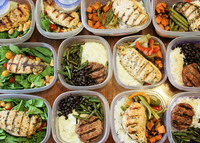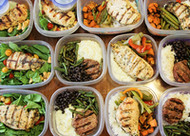8 Plan-Ahead Meal Prep Tips
Posted by Simple Girl on 2nd May 2017

Let's face it: The energy required to even think about making dinner every night is more than most of us really want to expend at the end of a long day. And if you're anything like the rest of us, once you finally settle on something that doesn't sound too time-consuming, you still have to go to the grocery store to get the ingredients and then do all the prep work before cooking it. From conception to the cleared table, dinnertime takes up the better part of an evening.
Enter a little thing called planning ahead. Again, if you're like the rest of us, planning ahead isn't really your natural state of being, but you're willing to try it if it means that dinnertime will be a hundred times less painless, which it will be.
So here's the gist: On a lazy afternoon, you decide what your menu's going to be for the week. You make a list, and you go shopping. Then, you prep. You form the burger patties and slice the vegetables and make the rice and boil the pasta and peel and chop the potatoes. You label and store everything in the fridge. When Monday, then Tuesday, then the rest of the days roll around, you don't look at your significant other and go, "What do you want for dinner?" only to get the dreaded response, "I don't know. What sounds good to you?"
No. Instead, you go, "Oh! We're having burgers tonight! All I have to do is cook the patties." That's right: The patties are all ready to hit the pan, the tomatoes are sliced and the lettuce torn, the potatoes are peeled and cut into tidy fries, and all you have to do is turn on some burners and stand there for a sec while it all cooks.
Here, then, are some pro tips for doing all your prep ahead of time for the coming week. Why not try it out and see how much time you save?
- Invest in some good storage containers. The last thing you want to do is spend all your saved time scrambling to find the right pre-prepped ingredients. Before you start, get yourself some nice (not necessarily expensive) lidded containers. In this case, "nice" means stackable and see-through. Get a variety of sizes. Also invest in some inexpensive zipper bags from the dollar section. Get quart and gallon sizes. These things will help you stay organized.
- Get a grease pencil. If you want to label your containers, don't use permanent marker or something that'll rub off as quickly as you write it, and don't fumble around with tape that just comes loose or leaves unsightly residue that really messes with your OCD. Instead, use a grease pencil, which will come off with a little Dawn or SOS action.
- Store cut potatoes in water. You don't want your potatoes looking like something that died, so be sure to cover them in cold water before refrigerating. Don't keep them in the water for much longer than 24 hours, though, or they won't cook up as well.
- Go frozen. Remember that frozen vegetables have as many–or more–nutrients than even fresh ones, they taste perfectly vegetably, and they're often less expensive. Opt for frozen when it makes sense rather than slaving over a cutting board chopping a week's worth of veggies.
- Clear the fridge. Before you embark on each week's prep, clean out the fridge. Discard old stuff, wipe down the shelves, and consolidate what can be consolidated. This will make both storage and retrieval much easier.
- Prep veggies first, then meat. By prepping your vegetables before your meat, you can be absolutely certain that there is no cross-contamination.
- Dust off the crock pot. By tossing a few meals a week directly into the crock pot in the morning, you'll end up not only not having to prep each time, but also not having to turn on the stove or oven at all.
- Prep extra, cook, and freeze. Here's another variation on the prep ahead theme: While you're at it in the kitchen, why not do double duty on dishes like casseroles and stews? Do all the prep work, and once you've put away the batch for the coming week, go ahead and fully prepare the second batch and start stocking the freezer for weeks that catch you unprepared. You could also store these extras in individual portions to take to work, save a few bucks on eating out.

